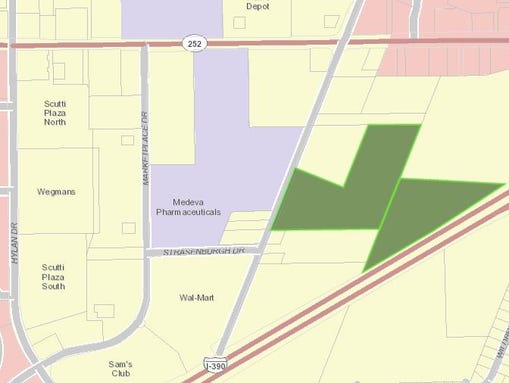Rochester-area gambling interests funding the No More Casinos campaign are leaving little to chance when it comes to their competitors.
A total of $1.1 million was spent during a recent six-month period on a barrage of robo phone calls and direct mailings, extensive use of social media, yard signs and more — all aimed at keeping Seneca Gaming Corp. from opening a new casino in western New York.
But it's the "more" in No More Casinos that's telling.
Funding for No More Casinos, said its spokesman John Riley, generally comes from two groups with gambling interests: The Delaware North Companies, which — through a subsidiary — owns and operates Finger Lakes Gaming & Racetrack; and Western Regional Off-Track Betting Corp., which owns the Batavia Downs Race Track.
And No More Casinos president E. Brian Hansberry was from 2007 to 2009 president and CEO of the Seneca Gaming Corp. — that's the same Seneca Gaming Corp. that No More Casinos is now trying to stop.
Hansberry issued a statement Friday saying, "My diverse experience in the gaming industry, including time at Seneca Gaming, has made it clear to me that the competitive advantage enjoyed by Seneca Gaming is unfair, not only to Finger Lakes Gaming and Batavia Downs, but to the entire hospitality industry in Rochester and throughout western New York."
Hansberry is also president of Delaware North Companies Gaming and Entertainment. No More Casinos has the same Buffalo address as Delaware North.
Phil Pantano, spokesman for the Seneca Gaming Corp., declined to comment about Hansberry heading up No More Casinos.
But in a statement issued this week about No More Casinos, Pantano said: "We're aware of lengths to which the coalition has gone to spread its anti-Indian campaign."
And he added: "While we are curious as to whether the group and its backers are expressing the same sentiments toward other, non-Indian gaming ventures across upstate New York, we're not distracted by their actions."
No More Casinos responded by saying that "being opposed to a tax-exempt, sovereign Native American casino in your community is not the same thing as being 'anti-Indian,' and any suggestion that they are the same is offensive."
The group said that Seneca Gaming "has a long and sad history of trying to play the 'race card' whenever their plans meet meritorious community opposition."
Extensive expenditures
No More Casinos formed last year, after the Seneca Nation of Indians announced that it was exploring the possibility of a casino in September.
By the time the Seneca Gaming Corp., which handles gambling interests for the Senecas, had in early March purchased 32 acres for a possible casino, No More Casinos was in full gear, having spent $690,411 by the end of February.
March 3: Senecas buy 32 acres in Henrietta for possible casino
The land that Seneca Gaming purchased for $2.75 million is on Clay Road, south of Jefferson Road, near Interstate 390 South and East Henrietta Road.

This map shows the purchased parcels in green. The Marketplace mall is at left.(Photo: Steve Orr)
After several Henrietta Town Board meetings were packed with opponents of the casino, board members voted 4-to-0 on March 19 against a casino in town. Two months later, Seneca Nation President Barry Snyder Sr. wrote a Monroe County legislator saying that the Senecas would "not pursue the siting of a casino development project in Henrietta, or Monroe County, at this time."
PDF: Read Snyder's letter
How the opposition to a Seneca casino in Henrietta would have shaped up without No More Casinos is impossible to say, but what can be said is that the group's lobbying expenses reports posted on the website of the New York State Joint Commission on Public Ethics show the following expenditures:
• $295,000 on Internet and social media consulting and advertising.
• $219,750 on live and robo calls.
• $211,450 on grass-roots canvassing.
• $150,907 on direct mail.
• $25,000 on radio.
• $25,000 on yard signs.
No More Casinos seems to have left few avenues unexplored to get its message out.
The invisible hand
A No More Casinos' mailing from earlier this year says that an "alliance of concerned citizens, local businesses, civic leaders, community groups and the clergy have come together to form the 'No More Casinos Coalition' here in Monroe County."
But almost all the $1.1 million that No More Casinos has listed as lobbying expenses was paid to West Seneca Consulting LLC, which is registered with the New York Secretary of State but based in Tallahassee, Florida.
Formed in November 2013, West Seneca has three managing members, including The Markham Group, which was described by a 2008 Miami Herald article as a Tallahassee political consulting company that represents gambling interests.
The Markham Group also did work similar to what West Seneca has been doing for No More Casinos in western New York. Markham is listed by the Arkansas Ethics Commission as receiving large payments in 2012 from the Stop Casinos Now Committee in Little Rock.
Riley, who has a marketing and consulting firm in Henrietta, said that West Seneca was formed by businesses that do contract work for No More Casinos.
We don't believe that the threat from the Senecas is gone. We think they are still actively pursuing a casino in our region — but they are doing it in a different way.
John Riley, No More Casinos spokesmanLocally, William A. Johnson Jr., the former mayor of Rochester, said that he has made two or three appearances for No More Casinos and taped a couple of radio spots — and was paid less than $6,000 for his services.
Johnson's most public appearance was at a news conference that released a No More Casinos' analysis showing that Salamanca and Niagara Falls experienced increased crime and higher tax rates after the construction of Seneca Nation casinos there.
May 1: Anti-casino coalition releases study
He said that he had been opposed to additional casinos before No More Casinos was formed, having been involved with the loose coalition that opposed the statewide referendum in November authorizing up to seven non-Native American casinos.
There are so many casinos already, Johnson said, that additional ones would result in layoffs.
Riley said that No More Casinos has provided "a voice for people" who share the anti-casino sentiment that surfaced in a statewide referendum. Although the referendum won enough votes statewide to pass, voters in Monroe County opposed it, with the 4,085 "no" votes exceeding the 3,648 "yes" in Henrietta.
Gov. Andrew Cuomo said that the initial plan under the authority granted by the referendum is to approve four casinos in upstate New York, though none is slated for the Rochester area.
The referendum does not deal with Native American casinos, which have a complicated approval process that goes up to the federal level.
Preventing another Seneca casino in this part of the state has become the focus of No More Casinos.

The Henrietta Town Board voted no to a casino earlier this year.(Photo: Getty Images/iStockphoto)
The group has collected 3,243 signatures opposing a new Seneca casino in Monroe County or anywhere else in western New York.
The fact that the Senecas still own the 32 acres purchased in March is evidence enough that they have not abandoned their plans, said Riley.
"We are in somewhat of a wait-and-see kind of mode," he said.
Riley said that what has been achieved "is clearly a success." But he added: "We don't believe that the threat from the Senecas is gone. We think they are still actively pursuing a casino in our region — but they are doing it in a different way."
Motives and money
Local residents have expressed opposition to the possibility of another casino for any number of reasons, from concerns about gambling becoming an addiction to worries about traffic becoming more congested with a casino.
And that came across at Henrietta Town Board meetings during the public comment sessions.
But the prime reason that No More Casinos opposes a new Seneca casino in the region is economic.
"A tribal casino would get tax and regulatory advantages that are unfair to local businesses, and we worry about what might happen to those businesses should the plan be approved," says the petition on the No More Casinos website.
The website further says that the casino would "only benefit a small group of people, and "create unjust competition that will likely force long-standing community businesses like Batavia Downs and Finger Lakes Raceway out of business."
Approval of the Seneca casino would put at risk 4,000 existing jobs and millions of dollars in tax revenues, the website says.
Riley noted that not only would a Native American casino not pay property taxes, but also would not pay sales or hotel taxes.
They had an ulterior motive. They didn't want competition.
Henrietta Supervisor Jack Moore on the No More Casinos campaignBut the Senecas have offered a somewhat different approach in Henrietta. Supervisor Jack Moore said that he was told by a member of the Seneca Nation Tribal Council, Jeff Gill, that the Senecas only wanted the casino to be tax exempt. Any hotels, restaurants and other retail business would pay taxes, according to Pantano.
Seneca Gaming said that going ahead with a casino would create 2,000 permanent jobs as well as 2,400 construction jobs to build the casino. It would hope to attract 3.5 million visitors a year.
Moore said that he doesn't have any second thoughts about the Town Board's vote, which he feels reflected popular sentiment.
He also said that "the people who would most likely go to a casino would be the people who could least afford to lose money."
But while Moore said that No More Casinos increased public awareness of the issue, it was "unfortunate" that funding to mobilize the opposition came from gambling interests.
"They had an ulterior motive. They didn't want competition," Moore said.
This e-mail address is being protected from spambots. You need JavaScript enabled to view it
Read or Share this story: http://on.rocne.ws/1gRO6Ui
| < Prev | Next > |
|---|







 Copyright © 2025 ToCasino.net Online Casino. All Rights Reserved. Designed by
Copyright © 2025 ToCasino.net Online Casino. All Rights Reserved. Designed by